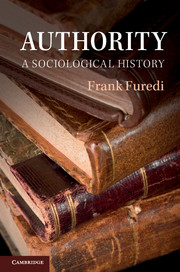Book contents
- Frontmatter
- Contents
- Preface
- Introduction: always in question
- 1 Thersites and the personification of anti-authority
- 2 Socrates and the quest for authority
- 3 Rome and the founding of authority
- 4 Augustus: a role model for authority through the ages
- 5 Medieval authority and the Investiture Contest
- 6 Medieval claim-making and the sociology of tradition
- 7 Reformation and the emergence of the problem of order
- 8 Hobbes and the problem of order
- 9 The rationalisation of authority
- 10 The limits of the authority of the rational
- 11 Taming public opinion and the quest for authority
- 12 Nineteenth-century authority on the defensive
- 13 Authority transformed into sociology's cause
- 14 The rise of negative theories of authority
- 15 By passing authority through the rationalisation of persuasion
- 16 In the shadow of authoritarianism
- Conclusion: final thoughts
- Bibliography
- Index
14 - The rise of negative theories of authority
Published online by Cambridge University Press: 05 June 2014
- Frontmatter
- Contents
- Preface
- Introduction: always in question
- 1 Thersites and the personification of anti-authority
- 2 Socrates and the quest for authority
- 3 Rome and the founding of authority
- 4 Augustus: a role model for authority through the ages
- 5 Medieval authority and the Investiture Contest
- 6 Medieval claim-making and the sociology of tradition
- 7 Reformation and the emergence of the problem of order
- 8 Hobbes and the problem of order
- 9 The rationalisation of authority
- 10 The limits of the authority of the rational
- 11 Taming public opinion and the quest for authority
- 12 Nineteenth-century authority on the defensive
- 13 Authority transformed into sociology's cause
- 14 The rise of negative theories of authority
- 15 By passing authority through the rationalisation of persuasion
- 16 In the shadow of authoritarianism
- Conclusion: final thoughts
- Bibliography
- Index
Summary
In the nineteenth century, authority was conceptualised as an institution founded on society. From the turn of the twentieth century, a turn in the thinking about this subject becomes evident. This shift was most vividly expressed in influential theories asserting that consent provided an irrational foundation for authority.
The 1890s is frequently represented as a turning point in attitudes towards modernity, industrialism, technological progress and the future. This period is often portrayed as one of crisis, which ‘changed the intellectual physiognomy of Europe’ and whose destructive consequences had, by 1914, ensured that ‘nothing remained of the proud structure of European certainties’. Radical syndicalist and socialist ideas competed with New Liberal social engineers for the soul of public life; culture reacted against previous ideals of rationality, and new doctrines stressing the role of intuition and the unconscious resonated with the mood of the times.
Although many practising sociologists, such as Hobhouse, Ward and Ross, possessed the social engineering ambitions of turn-of-the-century modernisers, the leading theoreticians of this discipline had internalised a cultural critique of modernity. As we noted in the previous chapter, conceptions of authority drawn from the past appeared to have greater meaning than those drawn from industrialised society. The contrast that Tonnies drew between community and society had echoes of a Romantic sensibility, in which his sense of the vitality and life of a community stood in sharp contrast to the dehumanising forces of change.2 In this era, theories highlighting the antithesis of culture and civilisation gained a significant audience, and technical, scientific and economic advances were frequently contrasted to cultural decline.
- Type
- Chapter
- Information
- AuthorityA Sociological History, pp. 328 - 349Publisher: Cambridge University PressPrint publication year: 2013



